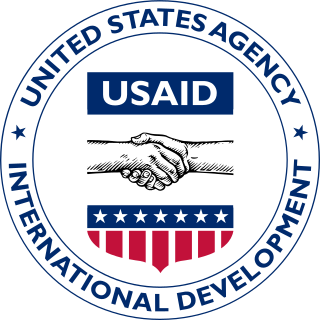
The United States Agency for International Development (USAID) is an independent agency of the United States government that is primarily responsible for administering civilian foreign aid and development assistance. With a budget of over $50 billion, USAID is one of the largest official aid agencies in the world and accounts for more than half of all U.S. foreign assistance—the highest in the world in absolute dollar terms.
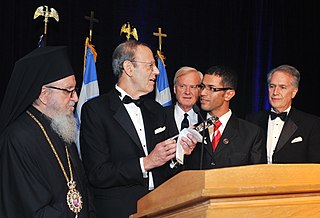
The National Endowment for Democracy (NED) is a quasi-autonomous non-governmental organization in the United States founded in 1983 with the stated aim of advancing democracy worldwide, by promoting political and economic institutions, such as political groups, trade unions, free markets, and business groups.
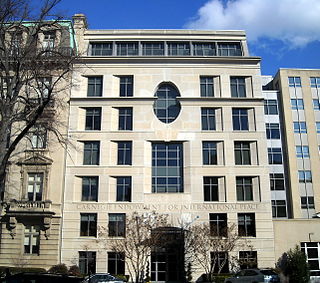
The Carnegie Endowment for International Peace (CEIP) is a nonpartisan international affairs think tank headquartered in Washington, D.C., with operations in Europe, South Asia, East Asia, and the Middle East, as well as the United States. Founded in 1910 by Andrew Carnegie, the organization describes itself as being dedicated to advancing cooperation between countries, reducing global conflict, and promoting active international engagement between the United States and countries around the world. It engages leaders from multiple sectors and across the political spectrum.
The International Foundation for Electoral Systems (IFES) is an international, non-profit organisation founded in 1987. Based in Arlington, Virginia, United States, the organization assists and supports elections and electoral stakeholders. Since 1987, IFES has worked in 145 countries and has programs in more than 50 countries throughout Asia-Pacific, Africa, Eurasia, the Middle East, and North Africa, and the Americas.

The state of Democracy in Middle East and North Africa can be comparatively assessed according to various definitions of democracy. De jure democracies in the Middle East and North Africa are according to system of government:

The National Democratic Institute (NDI) is a non-profit American non-governmental organization whose stated mission is to "support and strengthen democratic institutions worldwide through citizen participation, openness and accountability". It is funded primarily by the United States and other Western governments, by major corporations and by nonprofits like the Open Society Foundations.

The Greater Middle East is a geopolitical term introduced in March 2004 in a paper published by the Carnegie Endowment for International Peace as part of the United States' preparatory work for the Group of Eight summit of June 2004. The paper presented a proposal for sweeping change in the way the West deals with the Middle East and North Africa. It also denotes a vaguely defined region encompassing the Arab world, along with Afghanistan, Iran, Turkey, and sometimes the Caucasus and Central Asia.
In different administrative and organizational forms, the Food for Peace program of the United States has provided food assistance around the world for more than 60 years. Approximately 3 billion people in 150 countries have benefited directly from U.S. food assistance. The Bureau for Humanitarian Assistance within the United States Agency for International Development (USAID) is the U.S. Government's largest provider of overseas food assistance. The food assistance programming is funded primarily through the Food for Peace Act. The Bureau for Humanitarian Assistance also receives International Disaster Assistance Funds through the Foreign Assistance Act (FAA) that can be used in emergency settings.
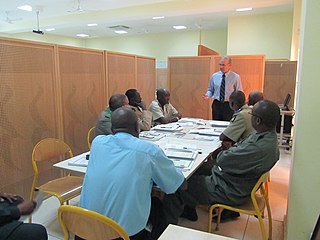
Democracy promotion, also referred to as democracy building, can be domestic policy to increase the quality of already existing democracy or a strand of foreign policy adopted by governments and international organizations that seek to support the spread of democracy as a system of government. In practice, it entails consolidating and building democratic institutions
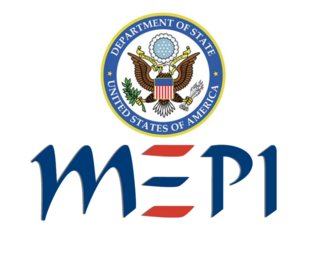
The U.S.-Middle East Partnership Initiative (MEPI) is a United States State Department program that fosters meaningful and effective partnerships between citizens, civil society, the private sector, and governments in the Middle East and North Africa (MENA) region to resolve local challenges and promote shared interests in the areas of participatory governance and economic opportunity and reform.

An elite pact, settlement or political settlement is an agreement or understanding between political elites which moderates the violence and winner takes all nature of unrestrained conflict. Such settlements are often understood to transform government from an autocratic mode into more pluralistic, democratic form. However, others view the political settlement as normatively neutral.

The Office of Transition Initiatives (OTI) is part of the United States Agency for International Development (USAID) Bureau for Democracy, Conflict, and Humanitarian Assistance (DCHA) and was developed to provide fast, flexible, short-term assistance to take advantage of windows of opportunity to build democracy and peace. It seeks to lay the foundations for long-term development by promoting reconciliation, jump starting economies and helping stable democracy take hold.

Democracy promotion by the United States aims to encourage governmental and non-governmental actors to pursue political reforms that will lead ultimately to democratic governance.

United States aid to Sudan has three key objectives: a definitive end to conflict, gross human rights abuses, and genocide in Darfur; implementation of the north–south Comprehensive Peace Agreement that results in a peaceful post-2011 Sudan, or an orderly path toward two separate and viable states at peace with each other; and ensuring that Sudan does not provide a safe haven for international terrorists. Sudan has experienced two civil wars since 1955, the second of which lasted 22 years. During this time, the U.S. was the largest provider of foreign aid to Sudan, largely focused on humanitarian aid through the U.S. Agency for International Development. Sudan is listed as the U.S. government's highest priority in Africa due to "its importance for counter-terrorism and regional stability, as well as the magnitude of human rights and humanitarian abuses" U.S. foreign aid to Sudan has begun to see some positive indicators of performance although critical reaction has said that aid to Sudan is neither strategic nor focused.
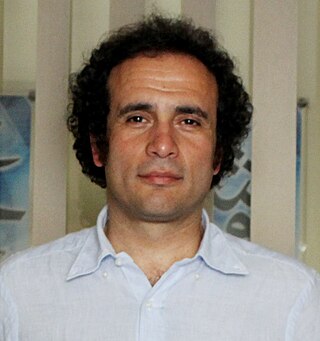
Amr Hamzawy is an Egyptian political scientist, human rights activist and public intellectual.

Carl Gershman served from 1984-2021 as the founding president of the National Endowment for Democracy (NED), a private, congressionally-funded, grant-making institution that supports non-governmental groups working for democracy around the world. During his presidency, NED’s annual congressional appropriation grew from $18.5 million in 1984 to $300 million a year in 2021, when it funded nearly 2,000 projects in 100 countries.
Sarah E. Mendelson is an American diplomat who served as United States Ambassador to the United Nations Economic and Social Council. Mendelson was confirmed by the Senate on October 8, 2015, and sworn into her post on October 15, 2015. In 2017, Mendelson was named Distinguished Service Professor and head of Carnegie Mellon University Heinz College's program in Washington, D.C.

The European Partnership for Democracy (EPD) is a membership-based network of not-for-profit organisations that describes its aim as "supporting democracy around the world".
Marina S. Ottaway teaches and researches at the Woodrow Wilson Center in Washington, D.C. Her research interests include the politics of development, with particular reference to Africa, the Balkans, and the Middle East.

Shanthi Kalathil is an American foreign policy analyst and former journalist, currently serving as a Washington D.C.-based senior fellow at the University of Southern California's Center on Communication Leadership and Policy and a visiting senior fellow at the German Marshall Fund's Alliance for Securing Democracy, where her work focuses on strengthening global democratic resilience in countering authoritarian influence. She is also a board member of the National Democratic Institute and Radio Free Asia.













